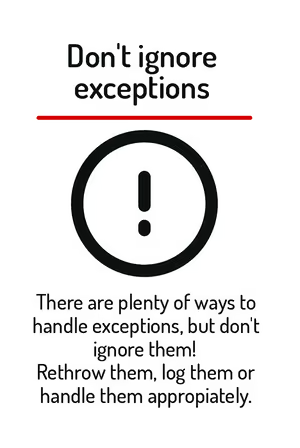Don’t ignore exceptions

Exceptions are signals that something went wrong. Ignoring them is like pretending a car’s warning light isn’t on - you might get lucky once, but eventually it will crash. Always handle exceptions meaningfully: log them, wrap them, or rethrow them so someone can respond.
Bad example:
try {
processOrder(order);
} catch (Exception e) {
// ignored
}Swallowing exceptions hides problems and makes debugging nearly impossible. Bugs silently accumulate and create unpredictable failures.
Better example:
try {
processOrder(order);
} catch (IOException e) {
logger.error("Failed to process order {}", order.getId(), e);
}Here, the exception is logged with context which gives maintainers visibility and traceability.
A valid alternative would be to throw a custom exception like this: throw new OrderProcessingException("Unable to process order", e);
With this a higher function could handle the exception more specifically and less generalised.
If logging or rethrowing is not needed immediately, at least add a comment explaining why it’s safe to ignore. Otherwise, treat every exception as valuable information about a potential problem.
Every time you commit, check: Am I ignoring an exception? If so, what is the safe and meaningful way to handle it? Handling exceptions properly reduces hidden bugs, improves stability, and makes your code more reliable.